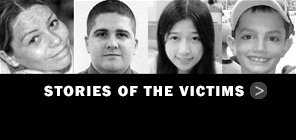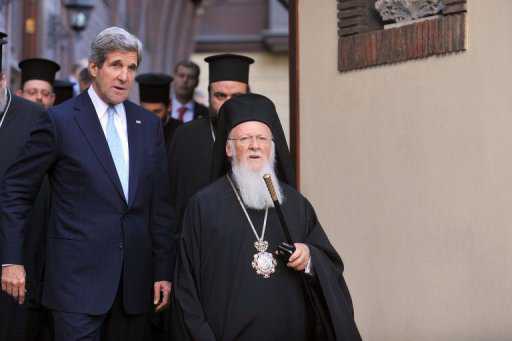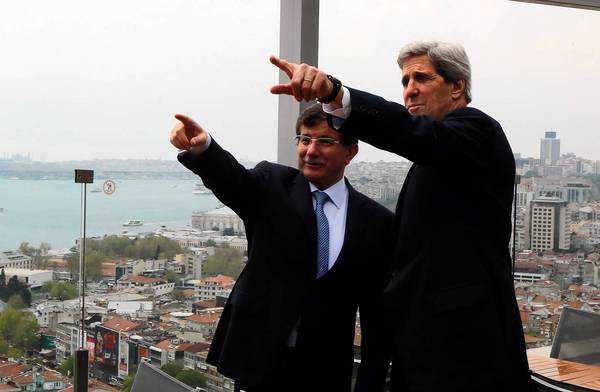
Video: The Massachusetts Bay Transportation Authority SWAT team – the four men who took the Boston Marathon bombing suspect into custody – detail the arrest of Dzhokhar Tsarnaev. VIDEO ADRESS
By Scott Wilson and Greg Miller, Updated: Tuesday, April 23, 8:09 PM
The injured suspect in the Boston Marathon bombings has told interrogators that he and his brother were driven by hard-line Islamist views and anger over the U.S. wars in Afghanistan and Iraq but had no ties to foreign militant groups, U.S. officials said Tuesday.
The statements made by Dzhokhar Tsarnaev, 19, from his hospital bed provide what authorities described as the clearest indication yet of the brothers’ apparent motivation in carrying out an attack that killed three people and wounded more than 250 others on April 15.
Graphic
See the names and stories of the Boston Marathon victims
More on this story:
Stories of the victims

12:00 PM ET
INTERACTIVE | Three people were killed and more than 250 injured when two bombs exploded at the Boston Marathon.
Aftermath of the Boston bombings

PHOTOS | With a suspect in custody, a city mourns the victims as investigators work to determine what happened.
Lawyers: Suspect’s wife aiding probe

VIDEO | Lawyers for the wife of the deceased marathon bombing suspect say she is doing everything she can to assist authorities.
Investigation into the Boston bombings

APR 15
MAP | Explore the sequence and locations of the unfolding events in the Boston area.
The information gleaned by a special team of FBI interrogators before charges were filed against Tsarnaev on Monday appears to be consistent with the direction of a broader investigation that has not uncovered any links to terrorist networks abroad, officials said.
“These are persons operating inside the United States without a nexus” to an overseas group, a U.S. intelligence official said. Instead, officials said, the evidence suggests that Tsarnaev and his 26-year-old brother, Tamerlan, who was killed during a confrontation with police, were “self-radicalized.”
The officials spoke on the condition of anonymity to describe the preliminary findings of an investigation in which information about key aspects of the plot is still being assembled.
U.S. officials briefed on the interrogation of Dzhokhar Tsarnaev said he has specifically cited the U.S. war in Iraq and the campaign in Afghanistan as factors motivating him and his brother in the alleged plot.
Neighbors have also described comments by the Tsarnaevs about the U.S. wars. Albrecht Ammon, 21, of Cambridge said in an interview last week that he had recently argued with the older Tsarnaev about U.S. foreign policy.
Tsarnaev said U.S. wars were based on the Bible, “a cheap copy of the Koran,” Ammon said. Tsarnaev also said that “in Afghanistan, most casualties are innocent bystanders killed by American soldiers,” according to Ammon.
President Obama has made repairing U.S. relations with the Islamic world a foreign policy priority, even as he has expanded drone operations in Pakistan and other countries, inflaming anti-U.S. sentiment among many Muslims.
After attending a classified briefing on the case, senior Republican lawmakers voiced concern that U.S. agencies had failed to share information leading up to the attacks.
“I think there’s been some stovepipes reconstructed,” said Sen. Saxby Chambliss (R-Ga.), the ranking Republican on the Senate Intelligence Committee, using a term that refers to bureaucratic barriers. Chambliss did not provide details.
Sen. Dianne Feinstein (D-Calif.), the chairman of the committee, disputed that characterization and praised the work of investigators, saying she had “complete confidence” the case would be solved.
U.S. officials on Tuesday described several other developments in the investigation into the Tsarnaev brothers’ actions, saying that the suspects may have killed a police officer at the Massachusetts Institute of Technology in an effort to steal his gun and arm themselves after they became the targets of a massive manhunt.
The officials said the officer, Sean Collier, appears not to have attempted to defend himself when he was shot in the head Thursday night. The older Tsarnaev brother already had a handgun, and officials said the two may have been seeking to obtain one for Dzhokhar. The attempt failed, officials said, because the brothers were not able to remove the officer’s weapon from a holster that was protected by a locking mechanism.
A video surveillance camera shows the shooting and the failed effort to pull the officer’s gun, officials said. A short time later, the two suspects allegedly carjacked a Mercedes sport-utility vehicle that they then loaded with explosives and took cover behind when they engaged in a shootout with police.
Graphic
See the names and stories of the Boston Marathon victims
More on this story:
Stories of the victims

12:00 PM ET
INTERACTIVE | Three people were killed and more than 250 injured when two bombs exploded at the Boston Marathon.
Aftermath of the Boston bombings

PHOTOS | With a suspect in custody, a city mourns the victims as investigators work to determine what happened.
Lawyers: Suspect’s wife aiding probe

VIDEO | Lawyers for the wife of the deceased marathon bombing suspect say she is doing everything she can to assist authorities.
Investigation into the Boston bombings

APR 15
MAP | Explore the sequence and locations of the unfolding events in the Boston area.
The criminal complaint filed Monday in U.S. District Court in Massachusetts mentions a single firearm, recovered from the scene of that shootout in Watertown, but lists at least a half-dozen explosives and homemade bombs.
Images from that firefight captured by a nearby resident and posted online appear to show the suspects exchanging fire with police down the street before detonating an explosive and then charging in the direction of police.
The older Tsarnaev, who remained on foot, was shot and later died from injuries sustained during that fight. The younger sibling climbed into the Mercedes, according to the images, then turned the vehicle around and drove in the direction of police as well as the position where his brother lay in the street.
Dzhokhar subsequently abandoned the vehicle and was later captured hiding under a tarp in a boat in the back yard of a home a short distance away. He has been charged with using a weapon of mass destruction in the bombing deaths, as well as malicious destruction of property, counts that could carry the death penalty.
Massachusetts prosecutors are expected to file separate charges against him in the killing of the MIT police officer.
It is unclear whether Dzhokhar Tsarnaev, whose ability to speak is impaired by a bullet wound to the neck, continued to answer questions after he was given his Miranda rights in a hospital bedside appearance by a judge. On Tuesday, his condition was described as “fair,” according to the U.S. attorney’s office in Boston.
The brothers’ backgrounds — including family ties to Chechnya, a region where Muslim groups have fought a bloody separatist campaign against Moscow for decades — raised suspicions that the two may have been in contact with militant groups.
On a YouTube page, Tamerlan Tsarnaev posted a series of videos that appeared to demonstrate his interest in radical Islamist ideology. But officials said they have not seen any connection between the brothers and terrorist networks overseas.
Previous plots, including a 2009 shooting at Fort Hood, Tex., and a 2010 attempted bombing in Times Square, were carried out by U.S. citizens with links to al-Qaeda operatives abroad.
“You will not see that [kind of relationship] here, to my knowledge,” a U.S. intelligence official said of the marathon case. The official, and others, stressed that investigators are still working to assemble a more detailed account of a six-month trip Tamerlan Tsarnaev took to Russia in 2012.
The FBI questioned the older Tsarnaev beforehand at the behest of Russian authorities who had become concerned that he was becoming radicalized, a request conveyed to officials at the U.S. Embassy in Moscow.
U.S. officials said the FBI ended the inquiry months later after seeing no reason to continue. Officials said they relayed that outcome to Russia, and asked for follow-up information from Russia, but that Moscow failed to respond. A spokesman for the Moscow Embassy in Washington declined to comment.
Graphic
See the names and stories of the Boston Marathon victims
More on this story:
Stories of the victims

12:00 PM ET
INTERACTIVE | Three people were killed and more than 250 injured when two bombs exploded at the Boston Marathon.
Aftermath of the Boston bombings

PHOTOS | With a suspect in custody, a city mourns the victims as investigators work to determine what happened.
Lawyers: Suspect’s wife aiding probe

VIDEO | Lawyers for the wife of the deceased marathon bombing suspect say she is doing everything she can to assist authorities.
Investigation into the Boston bombings

APR 15
MAP | Explore the sequence and locations of the unfolding events in the Boston area.
U.S. officials said there is no evidence so far that Tsarnaev made contact with Chechen extremists or otherwise attracted the attention of Russian authorities during his trip.
“The evidence points to the fact that they let him into the country and let him out,” the U.S. intelligence official said. “They didn’t take any legal action, which they could have while he was there.”
Meanwhile, an executive at a fireworks company, Phantom Fireworks, acknowledged Tuesday that the older Tsarnaev brother had purchased two large pyrotechnic devices from the company’s store in Seabrook, N.H., north of Boston, on Feb. 6. William Weimer, the company’s vice president, said in an interview that company records showed Tamerlan Tsarnaev had made the $199.99 cash purchase. Weimer said the company keeps fastidious records because a previous customer, Faisal Shahzad, had used his fireworks purchase from the company in an attempted attack on Times Square in 2010.
Weimer said he did not believe the brothers used the explosives in the marathon attacks. His company reported the purchase to the FBI after discovering the connection to Tamerlan Tsarnaev, he said.
The Boston Public Health Commission said Tuesday that at least 250 people have sought medical care at area hospitals forinjuries related to the bombings, a number that has grown over the past week as people have sought delayed treatment for minor injuries or hearing problems.
The youngest of those killed in the blasts, 8-year-old Martin Richard, was buried Tuesday morning in a private ceremony, his parents said.
Sari Horwitz, Ed O’Keefe and Julie Tate contributed to this report.























